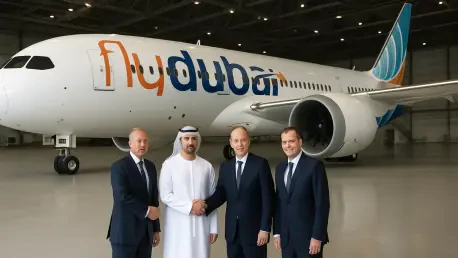The aviation sector in the Middle East has been a hotbed of growth, with Dubai standing tall as a global hub, and amidst this dynamic landscape, a staggering $13 billion deal between Flydubai and Boeing for 75 Boeing 737 MAX aircraft, announced at the Dubai Airshow, has captured widespread attention. This agreement, which includes options for an additional 75 aircraft, signals bold ambition from the Dubai-based low-cost carrier. What does this mean for the airline, the region, and the broader industry? This roundup gathers perspectives from various industry voices, analysts, and stakeholders to unpack the implications of this landmark Memorandum of Understanding (MoU), offering a multifaceted view on fleet expansion, regional dominance, and technological trends.
Exploring the Scale and Strategy Behind the Agreement
Fleet Growth to Meet Rising Demand
Industry observers have noted that Flydubai’s acquisition of 75 Boeing 737 MAX aircraft positions the airline to tackle the escalating travel demand across the Middle East, Europe, Africa, and Asia. Many emphasize the strategic foresight in opting for a mix of 737 MAX variants, including the 737-8, 737-9, and 737-10, which offer scalability for diverse routes. This move is seen as a calculated step to stay ahead in a competitive market.
Some analysts highlight the potential challenges accompanying such rapid expansion, such as supply chain bottlenecks or the complexities of integrating new aircraft into existing operations. However, there’s a consensus that Flydubai’s proactive approach contrasts with the more cautious strategies adopted by other regional carriers, showcasing a willingness to invest heavily in future capacity.
A differing viewpoint focuses on the replacement of older aircraft within Flydubai’s current fleet of 96 Boeing 737s. Experts suggest that this modernization drive not only boosts operational efficiency but also aligns with global trends prioritizing fuel-efficient fleets. The balance between growth and renewal is viewed as a critical factor in sustaining profitability.
Alignment with Dubai’s Aviation Ambitions
Stakeholders in the aviation infrastructure space point out that this MoU dovetails seamlessly with Dubai’s vision to cement its status as a leading global aviation hub. The role of facilities like Dubai World Central (DWC) is frequently cited as a backbone for such expansive plans, providing the necessary scale for increased traffic and connectivity.
Several industry commentators stress the importance of Dubai’s open-skies policies and progressive regulations in enabling Flydubai’s bold moves. These policies are often credited with fostering an environment where airlines can expand networks without the constraints faced in more restricted markets, giving Flydubai a distinct edge over competitors.
On the flip side, some voices caution about external risks, including geopolitical tensions and economic volatility, that could impact Dubai’s aviation goals. Despite these concerns, the general sentiment leans toward optimism, with many believing that this deal strengthens Dubai’s competitive position against other regional hubs vying for dominance.
Technological and Market Trends in Focus
Innovations Driving the Boeing Partnership
Aviation technology experts have lauded the Boeing 737 MAX family for its advancements in fuel efficiency and operational flexibility, elements that resonate with the industry’s push toward sustainability. These features are often highlighted as key reasons why Flydubai continues to bet on this aircraft model for its growth plans.
Another perspective focuses on how this order reflects a broader trend in the Middle East aviation market, where single-aisle aircraft are increasingly favored for their versatility across short- and medium-haul routes. This shift is seen as a pragmatic response to diverse passenger demands, balancing cost and reach effectively.
Challenging the notion that low-cost carriers prioritize budget over innovation, several industry watchers argue that Flydubai’s investment demonstrates a commitment to both. The integration of cutting-edge technology with a cost-conscious model is viewed as a blueprint for other budget airlines looking to scale without compromising on quality.
Historical Trust and Future Collaborations
Analysts tracing the partnership between Flydubai and Boeing point to a legacy of trust, with significant orders dating back over a decade, including a record-breaking commitment for 225 737 MAX aircraft in 2017. This consistent collaboration is often cited as evidence of mutual confidence in navigating market challenges together.
Some industry insiders note that while Flydubai has recently diversified its fleet with orders from other manufacturers like Airbus, the repeated commitment to Boeing underscores a strategic preference for the 737 MAX’s capabilities. This balance of diversification and loyalty is seen as a smart approach to risk management.
Looking ahead, there’s speculation among experts about how this deepened relationship might influence Boeing’s market share in the Middle East. Many suggest that sustained partnerships like this could set a precedent for other regional carriers, potentially shaping future procurement trends in the coming years from 2025 onward.
Practical Takeaways from Diverse Perspectives
Synthesizing the varied opinions, it’s clear that Flydubai’s $13 billion deal is a pivotal moment for both the airline and the region. Aviation strategists emphasize the importance of long-term fleet planning, as demonstrated by this MoU, in addressing market volatility and ensuring sustained growth. The focus on modernizing a fleet of nearly 100 aircraft is often cited as a benchmark for efficiency.
Another key insight from industry discussions is the value of strong manufacturer partnerships. Stakeholders argue that Flydubai’s enduring collaboration with Boeing offers a model for other airlines on how to secure reliable aircraft supply and timely deliveries, critical components for maintaining operational momentum.
For those keen to delve deeper, monitoring Flydubai’s network expansion over the next few years provides a real-time case study. Many experts recommend tracking how the airline leverages this deal to enhance connectivity, offering lessons on aligning corporate objectives with broader regional goals in a fast-evolving sector.
Reflecting on the Impact and Next Steps
Looking back, the discourse surrounding Flydubai’s massive Boeing deal revealed a spectrum of optimism and caution among industry voices. The agreement stood as a testament to strategic ambition, with diverse perspectives highlighting its role in fleet modernization and regional leadership. It also sparked debates on balancing innovation with operational challenges.
Moving forward, airlines and stakeholders could consider adopting similar long-term planning frameworks to navigate uncertainties in travel demand. Exploring partnerships that prioritize both technological advancement and reliability might offer a path to resilience. Additionally, keeping an eye on how Dubai’s aviation ecosystem evolves could provide valuable insights for global players aiming to replicate such success in their own markets.









